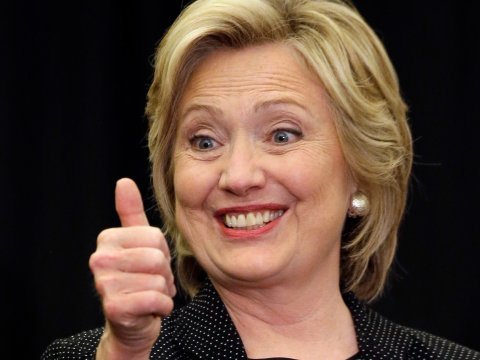
Having a woman set to represent a major political party in the race for the U.S. presidency is historical. I wish this could be the only way gender is a factor.
This is a very big deal - regardless of your political positions, regardless of how you plan to vote, regardless of your views on Hillary Clinton's strengths and flaws. It's a big deal because it is a first, because it is an important step in the whole area of women reaching top leadership positions, and because of its influence on our unconscious images of leadership.
I wish that were the end of the importance of Clinton's gender. Unfortunately her gender will play in several negative ways.
One of the first controversies was Secretary Albright's repeating her famous slogan about women supporting other women. As always, context matters. That slogan does not mean that women should vote for someone because she is a woman! There is a special place in hell for women who sabotage and undermine other women - not for those who choose not to vote for a woman. In my view, no one should vote for Clinton because she is female. But no one should oppose Clinton because she is female.
Hillary Clinton is, of course, imperfect. Many people oppose her on substantive grounds - conservatives legitimately oppose her liberal policies. There are real questions about her judgment and honesty in certain situations. But at least some of her opposition, I believe, is because of her gender. Clinton's "unfavorability ratings" (while not as bad as the other major party's presumptive nominee) are high. How much of that is because of unconscious gender bias?
Research shows that "likeability" and success are positively correlated for men but negatively correlated for women. Jill Abramson and other successful women have pointed to the "likeability penalty" that successful women face. To succeed (and be seen as leaders), for example, women must exhibit directness and decisiveness. But these behaviors, when displayed by women, can be called "pushy and difficult" - because they "violate shared cultural understandings of how women should act."
This is the "double bind." Mrs. Clinton will be criticized when she is "soft" (her tone or style is feminine) - and when she is tough (it is masculine). Joan Vennochi wrote in the Boston Globe, women in public are "routinely marginalized as too old or too young, too tough or too soft; too ugly or too sexy."
As with other women in the public eye, there is disproportionate focus on appearance. Vennochi expects that Clinton's pantsuits and hairstyle "will generate more scathing reviews" than Trump's "paunch and orange comb-over."
I prefer to avoid talking about the presidential race. But the issue of gender is just too prominent to avoid talking about it. I am not advocating for or against a political candidate. I am advocating for awareness of how gender can play in this election - and of the role of unconscious gender bias.
Unconscious bias is generally unintentional, non-malicious and unrecognized. Until they examine deeply rooted beliefs and images, people remain unaware that they hold "cultural understandings of how women should act," judge negatively the same behavior acceptable in men, or focus on more superficial aspects of a woman. Many (because they can't see it) will defend that the charge of gender bias is unfounded, the ranting of angry "feminists." Or call it the "woman card."
That phrase insults women by suggesting women will vote based on gender vs. substance. It suggests that womanhood is an unfair advantage. We know not being a male has historically been a major disadvantage! As Alexandra Petri points out in the Washington Post, this "card" entitles women to such rewards as holding only 20% of Senate and House of Representatives seats, to sexual harassment, and to a "sizable discount on your earnings."
Some have called the presumptive Republican nominee a misogynist and are expecting a "gender war." On the scale from misogynist to feminist, the two candidates couldn't be further apart. It is not the candidates or their positions on this scale that concern me. It is the unconscious biases of the electorate!
My work is about bringing awareness to unconscious biases, primarily in the business world. How can we do that with voters and the general public?